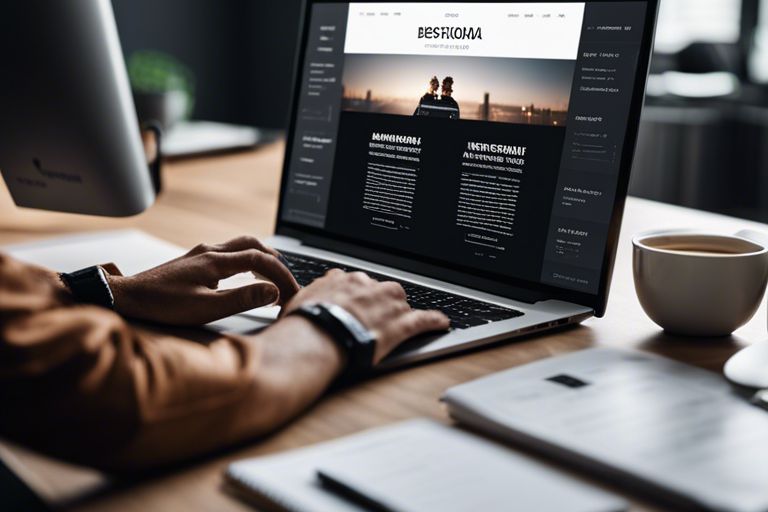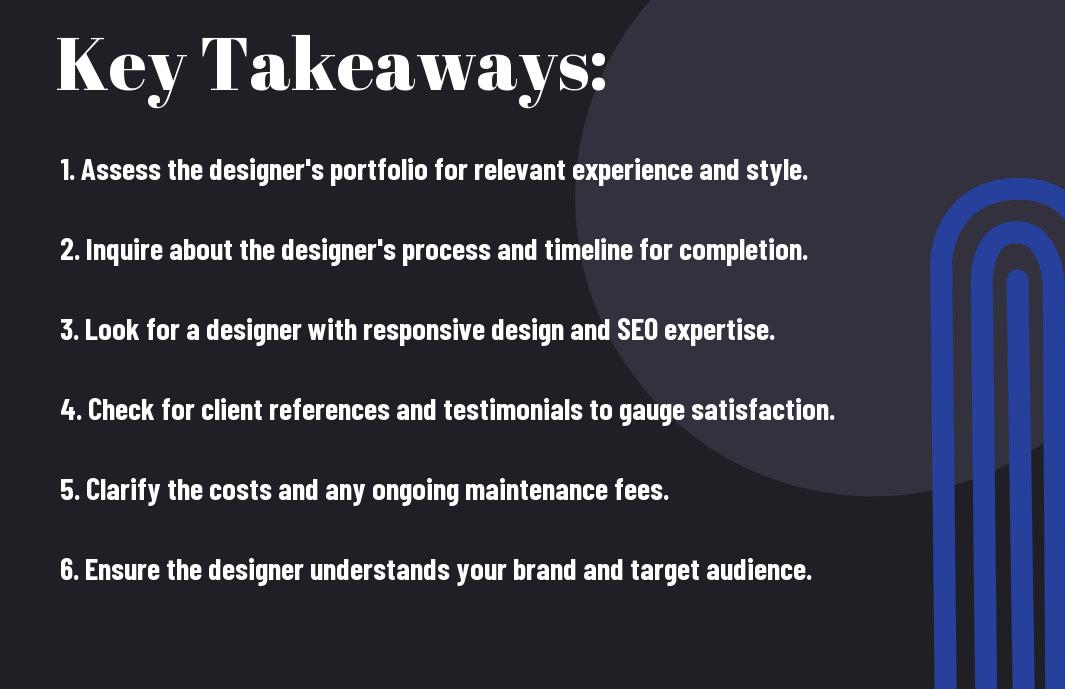Are you in the market for a top-notch website designer to elevate your business’s online presence? Finding a skilled and reliable professional to handle your website is crucial for the success of your business. The right website designer can create a highly functional, visually appealing website that attracts and engages your target audience. On the flip side, choosing the wrong designer can lead to a waste of time, money, and resources. In this blog post, we’ll provide you with essential tips and strategies to help you navigate the process of finding the best website designer for your business. Whether you’re a small business owner or a seasoned entrepreneur, we’ve got you covered with expert guidance on selecting the perfect candidate for the job.
Key Takeaways:
- Research extensively: It’s crucial to thoroughly research website designers to ensure they have the necessary skills and experience to meet your business needs.
- Look at their portfolio: Reviewing a designer’s portfolio can give you insight into their style, creativity, and the types of projects they have worked on in the past.
- Check for client feedback: Reading client testimonials and reviews can provide valuable information about a designer’s professionalism, communication, and ability to deliver results.
- Consider their approach: Look for a designer who takes the time to understand your business goals and target audience, and can offer a customized and strategic approach to website design.
- Discuss pricing and timelines: Before making a decision, ensure that the designer can work within your budget and provide a clear timeline for the completion of the project.


Understanding Your Website Needs
Assuming you’re in the market for a website designer, it’s important to have a clear understanding of your website needs before you start your search. This will help you find the best designer who can meet your specific requirements. For a detailed guide on finding the perfect website designer, check out Website Design: How to Find the Best Web Designer.
Establishing Your Brand Identity
When it comes to your website, it’s crucial that it reflects and reinforces your brand identity. Your website should be an extension of your brand, ensuring a consistent and cohesive experience for your visitors. This means incorporating your brand colors, logo, typography, and overall brand aesthetic into the design. Your website designer should understand your brand and be able to translate it into a visually appealing and functional website that represents your identity accurately.
Defining Website Functionality and Goals
Before embarking on the process of hiring a website designer, it’s important to clearly define the functionality and goals of your website. This includes determining what you want your website to accomplish, whether it’s to generate leads, showcase your portfolio, sell products, or simply provide information. Defining these goals will help you communicate effectively with your designer and ensure that they can create a website that meets your needs. Additionally, consider any special features or integrations you may require, such as e-commerce capabilities, contact forms, social media integration, and more. Defining your website’s functionality and goals upfront will save you time and ensure that your designer delivers a website that aligns with your objectives.
Selecting the Right Web Designer
Unlike choosing a designer for a one-time project, finding the best web designer for your business is crucial for establishing and maintaining an effective online presence. When it comes to selecting the right web designer, you need to consider various factors such as experience, portfolio, and overall design process. Taking the time to thoroughly evaluate potential designers will ensure that you find the perfect fit for your specific business needs.
Evaluating Experience and Portfolio
When choosing a web designer for your business, it’s essential to look for someone with extensive experience in the industry. You want to work with a designer who has a proven track record of creating high-quality, engaging websites for businesses similar to yours. Take the time to review their portfolio to get a sense of their style and capabilities. Look for examples of websites they have designed that align with your vision for your own site. Pay close attention to the user experience and functionality of the websites in their portfolio, as these are critical factors in determining the quality of their work.
Understanding the Designer’s Process
A web designer’s process can vary significantly from one professional to another. It’s important to have a clear understanding of how the designer approaches projects and collaborates with clients. Look for a designer who is willing to take the time to understand your business, target audience, and overall goals for your website. You want a designer who values your input and is open to incorporating your ideas into the design process. Additionally, inquire about their timeline for completing projects and their process for making revisions or updates to the design. This will give you a better understanding of what to expect when working with them.
The Design Process
Keep in mind that the design process is a collaborative effort between you and the website designer. It involves several key stages, starting from the initial concept and design to the final launch of your website. Throughout this process, you and the designer will need to communicate effectively, provide feedback, and work together to ensure that the end result aligns with your vision and business goals.
Communication and Collaboration
Effective communication and collaboration are essential during the design process. You and the website designer should be in constant communication to ensure that your ideas and expectations are clearly understood. Make sure you are available to provide input and feedback as the design progresses, and encourage open and transparent communication with the designer. This will help ensure that the final website design accurately reflects your brand and meets your business needs.
Review and Feedback Cycles
During the design process, there will be several review and feedback cycles to ensure that the design is moving in the right direction. It’s important to stay involved and provide timely and constructive feedback. Be clear about what you like and don’t like, and provide specific examples to help the designer understand your preferences. This will help streamline the design process and ensure that the final product meets your expectations.
Remember that clear communication, collaboration, and active participation in the review and feedback cycles are crucial to the success of your website design project. By staying engaged and providing valuable input, you can help ensure that the final design accurately represents your brand and effectively serves your business goals.
Budget and Contract Considerations
For more detailed advice on finding the best website designer for your business, check out this article on 9 Seriously Great Tips for Finding the Best Website Designer.
Determining Your Budget
When looking for a website designer, it’s essential to establish your budget beforehand. This will help you narrow down your options and ensure that you don’t overspend. Consider the size and scope of your project, as well as the level of expertise and quality you require. It’s important to be realistic about what you can afford while also recognizing the positive impact that a well-designed website can have on your business.
Navigating Contracts and Agreements
Once you’ve found a website designer that meets your budget and requirements, it’s time to navigate the contract and agreement process. It’s crucial to carefully review all terms and conditions to ensure that your rights and interests are protected. Look for clauses related to timelines, deliverables, and payment schedules. It’s also important to clarify ownership of the final product and any ongoing maintenance or support agreements.
Tips for Finding the Best Website Designer for Your Business
Drawing together all of the tips and suggestions provided, it is clear that finding the best website designer for your business requires a strategic approach. You should start by clearly defining your needs and goals, then conduct thorough research to find a designer with the right skills and experience to meet those needs. It is important to consider the designer’s portfolio, client testimonials, and communication style, as well as their ability to understand and execute your vision. By taking the time to find the right designer, you can ensure that your website accurately represents your brand and effectively reaches your target audience.
FAQ
Q: Why is it important to find the best website designer for my business?
A: Having a well-designed website can significantly impact your brand’s online presence and influence potential customers. A professional website designer understands the importance of user experience, functionality, and visual appeal, which are crucial factors for driving online success.
Q: What should I look for when searching for a website designer?
A: Look for a designer with a strong portfolio showcasing a variety of website designs that resonate with your business needs. Also, consider a designer who has experience in your industry and understands your target audience.
Q: How can I assess the quality of a website designer’s work?
A: Ask for references and take the time to review their previous clients’ websites. Additionally, inquire about the designer’s process, including their approach to user experience, mobile responsiveness, and search engine optimization (SEO).
Q: What questions should I ask a potential website designer before hiring them?
A: Inquire about their design process, timeline for completion, and pricing structure. Ask about their understanding of your industry and target market, and how they plan to incorporate your branding and messaging into the website design.
Q: How can I ensure that the website designer is the right fit for my business?
A: Schedule a consultation to discuss your vision and goals for the website. Pay attention to the designer’s communication style, level of professionalism, and willingness to listen and understand your needs. Additionally, consider their ability to provide ongoing support and maintenance for your website after the initial design is complete.
